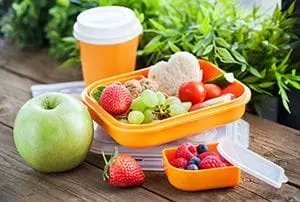
Kids and snacks go together. However, as parents, you can provide better choices to help prevent cavities that we often find in the dental chair at routine check-ups.
Frequent snacking on foods containing sugar increases a child's risk of getting cavities. Each time your child eats sugar, plaque in the mouth combines with sugar to produce acid. This acid attacks the teeth and over time can destroy the tooth structure. Your child should eat a variety of foods including grains, milk and milk products, meat, vegetables, and fruits. Avoid establishing a "sweet tooth" by limiting foods high in sugar.
Tips for Good Snacking Habits:
- Offer your child low sugar snacks like vegetables or cheeses.
- Cut down on the “exposures” per day that your child eats sugar in food and snacks. Acidity stays high in the mouth with frequent snacking, increasing the risk of cavities.
- Avoid soft, sticky sweets that lodge on and between tooth surfaces such as fruit chews, toffee, or even dried fruits.
- Natural sugars (found in breast milk, fruit, milk, bananas) have the same effect on your child's teeth as refined sugars (found in soda pop, ice-cream, and candy). Remember even seemingly good foods like fruit pouches contain sugars that can be harmful if exposed to the teeth for long periods of time.
- Don't give your child sugar-rich foods that stay in the mouth over a long period and prolong the acid attack, such as gum, hard candies, lollipops, etc.
- If you do serve sweets, serve them with meals. Increased saliva flow during meals helps neutralize the effects of sugar on the teeth.
- Brushing and flossing after snacks and meals is important for preventing cavities that can form from exposure to sugar.
